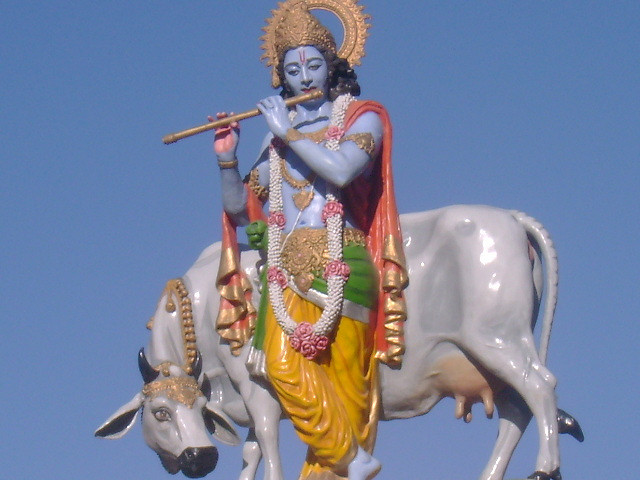Tensions escalated in Mathura after controversial inscriptions surfaced outside several shops, claiming that Lord Krishna was a Jat. The inscriptions, which sparked widespread protests, contained the name of Kunwar Singh along with a phone number. The local authorities moved quickly to address the growing unrest, registering an FIR and launching an investigation into the matter. The incident has triggered a fierce debate about religious identity, regional politics, and the manipulation of religious figures for social and political gains.
The dispute ignited when local residents discovered the inscriptions on the walls of various shops in the city. These claims, suggesting that the revered Hindu deity Lord Krishna belonged to the Jat community, quickly stirred strong reactions among various groups. For many, Lord Krishna is a central figure in Hinduism, and any challenge to his traditional identity is seen as an affront.
The inscriptions appeared to be part of an effort to alter the narrative surrounding Krishna’s lineage, tapping into ongoing caste-based tensions within the region. Jats, a prominent agricultural community in India, have historically been seen as a powerful and politically influential group in several states, particularly in the northern regions. The assertion that Krishna was a Jat could potentially carry political overtones, especially in a region where caste dynamics play a significant role in shaping social and political identities.
The name Kunwar Singh, included in the inscriptions, has raised questions about whether this is an individual or a symbolic reference to the famous Jat leader of Bihar, known for his role in the 1857 revolt against British colonial rule. However, local officials have yet to confirm any connection to the historical figure.
Protestors took to the streets of Mathura, expressing their outrage over what they saw as an insult to their religious beliefs. Some local Hindu groups demanded immediate action from the authorities, while others called for the perpetrators to be identified and punished. On the other hand, Jat organizations have supported the claim, seeing it as a valid assertion of their community’s historical significance and its association with Lord Krishna. The division highlights the growing tensions over identity and caste politics in India, particularly in areas like Mathura, where caste-based politics have a long history.
The local police acted swiftly, registering a First Information Report (FIR) and starting a probe into the origins of the inscriptions. While the investigation is still in its early stages, the police have been gathering information on the phone number provided in the inscriptions, hoping it will lead to the responsible parties. Several shops in the area have been identified as the sites where these inscriptions were found, but authorities have yet to confirm whether the owners of the shops are directly involved or if they were merely locations where the messages were written.
The controversy surrounding Lord Krishna’s caste identity is not an isolated incident but rather part of a broader debate that has been growing in India in recent years. In various states, there has been a concerted effort by certain groups to claim association with Hindu deities, attempting to solidify their own status and influence within society. This is particularly evident in the case of the Jat community, which has increasingly used religion to bolster their political and social standing.
However, the matter has become more complex due to the highly charged political environment in India. Caste-based politics have always been a significant force, but they have taken on an even greater role in recent years. Political parties across the spectrum have attempted to leverage caste identities for electoral gains, often by claiming connections to powerful religious figures. This trend has seen an uptick in various parts of India, including in Mathura, where the dispute over Lord Krishna’s identity may have deeper political implications.
As the investigation continues, there is mounting pressure on the authorities to bring clarity to the situation. While some protestors demand swift action and an end to what they consider sacrilegious claims, others are calling for a broader dialogue about caste identities and their place in modern India. The unrest in Mathura may be a precursor to similar conflicts in other parts of the country, as caste politics remain a highly sensitive issue that continues to shape public discourse.




 Devendra Fadnavis Is Once More The Maharashtra Chief Minister
Devendra Fadnavis Is Once More The Maharashtra Chief Minister 